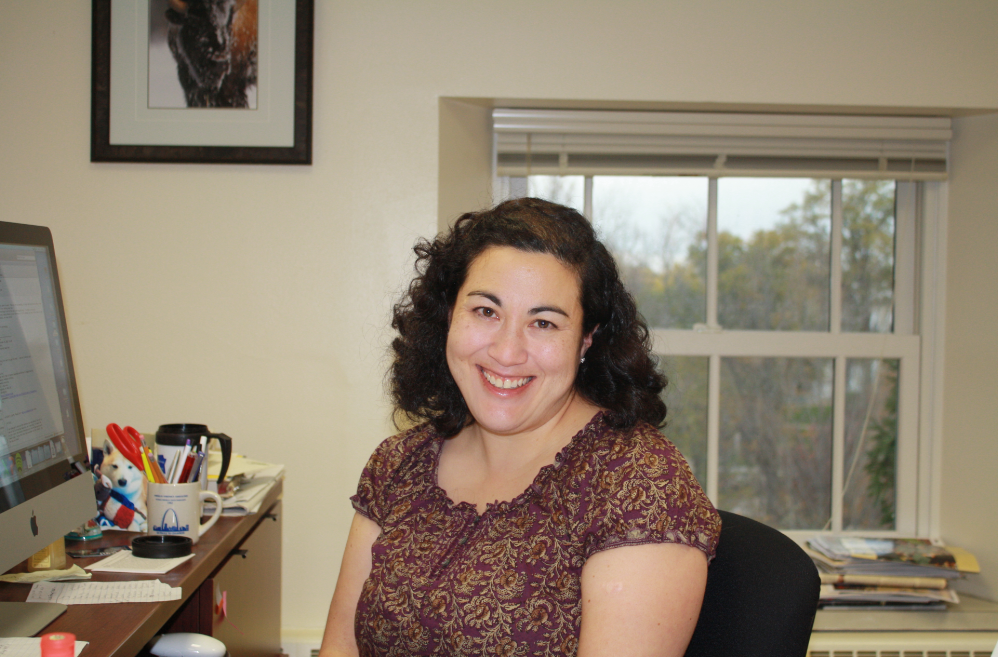
(Photo by Craig Sherwood)
RY: You wear many hats here at Lawrence; talk a little bit about that.
MR: Like many people at Lawrence, I have multiple roles. Besides teaching in the history department, I also teach in the gender studies and environmental studies departments. However, for this year and next year, I am teaching part time, because I am the director of the Engaged Learning program here at Lawrence. This program hasn’t been around very long, so we are still developing it and getting it started. My job with the Engaged Learning program is to develop leadership opportunities for Lawrence students to help them connect their academic interests with service in the community. I work very closely with Kristi Hill in the Volunteer and Community Service Center.
RY: Could you elaborate a bit more on what “engaged learning” means? What is the goal of Lawrence’s Engaged Learning program?
MR: By “engaged learning,” we mean that students can have experiences outside of the classroom for credit — although they don’t always get credit — and they can apply what they are absorbing in the classroom to the needs of the local Fox Cities community, or even a community overseas.
One way in which it’s different from volunteer work is that ideally engaged learning is done for credit, under the supervision of a faculty member. Although internships sometimes fall under this category, internships are often most important for the professional, hands on training that the student receives, whereas with engaged learning, it is the student who is giving back to the community.
Some of the engaged learning internships do involve a small stipend, but for the most part, this work is unpaid. Other universities have a service requirement for students. Lawrence doesn’t have that, but I think that fits well with the spirit of engaged learning. Students should be participating in these activities because they want to and are interested in them, and not because they want to ‘check off’ another requirement.
My vision is that someday Lawrence will have a lot of classes in which students apply the course content to needs in the community, and that way both the community and the students will benefit. The philosophy is that people learn something best when they have the chance to explain it someone else, and bring together different ideas and apply them to a situation that isn’t just a textbook simulation.
RY: How did you get interested in working with this program?
MR: Provost and Dean of the Faculty Burrows asked me if I would be willing to participate, and I thought it would be an exciting opportunity. I’ve always been really interested in nonprofit work, community service work and civic engagement. In a lot of ways, if I hadn’t become a professor, I would have wound up working in a public policy or activist type setting. This was a fun way for me to get back into that type of role while still being a professor.
RY: How can students get involved with Engaged Learning?
MR: We are working on getting the word out more. We have a Facebook page now, and we are sponsoring more events. The recent Poverty Simulation was one of our events.
RY: What do you do when you aren’t teaching or working on Engaged Learning Projects?
MR: Well, I work on my own research, which has to do with the relationship between the history of gender and the history of the environment. As far as ‘regular life’ goes, I love to travel. The last time I went on leave, I spent six months in Asia. I stayed first in Beijing, and as a historian, I found that Beijing was a great place to observe world historic processes. You’ll be walking down the street and you’ll see a huge skyscraper with LED screens playing commercials for the most up to date technology, and then there will be a guy with a mule cart walking down the same street with a pile of cabbages in the back.
I also went to Hong Kong, Vietnam, Cambodia and Laos. It was a dream; seeing places like Angkor Wat was incredible. I will definitely be taking another big trip when I get some more time for leave. I’d love to go to India, but I’ve also never been to Latin America, so Brazil or Argentina would be pretty cool. Travel is really great for me because I’m actually a very shy person by nature, so travel forces me to get out of my shell and my comfort zone.
RY: Have you learned any of the languages of the places you’ve traveled?
MR: I’ve studied a lot of languages. I’ve had classes in Spanish, German, French and Latin, but strangely enough the language that I’m currently most competent in is Mandarin, because of the time I’ve spent in China. There’s nothing like that immersion experience, as language teachers will tell you! I’m not very good at writing, though, so I try to practice whenever I can.
RY: And after all that traveling, you’ve ended up in Appleton!
MR: Yes, I had no idea I was going to end up in the Midwest. I grew up in California, and my friends there now can’t believe how low the cost of living here in Appleton is! No, seriously, Appleton is a great community.
This is going to sound cheesy, but Lawrence students are the best. They have an amazing love of learning and a lot of enthusiasm. I feel really lucky to be a part of people’s college experiences. You grow and change a lot in college, and I get to be a little part of people discovering who they want to be. Even if students don’t wind up being passionate about the same things I’m interested in, I’m just so happy they’ve figured out what they want to do.
